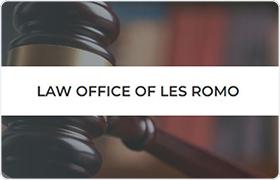 Austin Eminent Domain Lawyers, Texas
Austin Eminent Domain Lawyers, Texas
Sponsored Law Firm
-
 x
x

Click For More Info:
-
Law Office of Les Romo
102 West Morrow Street Suite 202 Georgetown, TX 78627» view mapEstate Law Helping You Understand Your Options
Attorney Les Romo can help protect your interests and resolve your legal issue in the best possible way. Attorney Romo is dedicated to vigorously representing his clients.
800-769-7481
Sponsored Lawyers
1-1 of 1 matches
Divorce & Family Law, Estate, Real Estate, Wills & Probate, Eminent Domain
The attorneys at the Law Office of Derek R. Van Gilder bring decades of experience and success to the table representing individuals and businesses in all aspects of civil law. Mr. Van Gilder has achieved the highest possible rating from Martindale-Hubbel and AVVO that a Texas lawyer can earn during his more than 30 years of practicing law. We represent clients in lawsuits and other legal matters throughout Texas. Nothing is a substitute for actual legal experience when you need an experienced Texas attorney. When the time comes for you to find a Texas lawyer you can rely on, the Texas attorneys at the Law Office of Derek R. Van Gilder will be there with you every step of the way. We are your "home town" Bastrop, Texas lawyers--providing "big city" experience with "small town" service. When you need a responsive and attentive Texas lawyer to take on your legal problems, the Law Office of Derek R. Van Gilder is here for you. Located just minutes from the State Capital of Austin, our Texas lawyers regularly represent individuals and businesses in Bastrop County, Travis County, Williamson County, Lee County, Caldwell County, Burleson County and across the great State of Texas in all types of civil legal matters. When you need an Austin, Texas lawyer, the Law Office of Derek R. Van Gilder is located right outside of Austin. We routinely and regularly accept cases in Austin.
(more)


 Les Romo Georgetown, TX
Les Romo Georgetown, TX Practice AreasExpertise
Practice AreasExpertise

